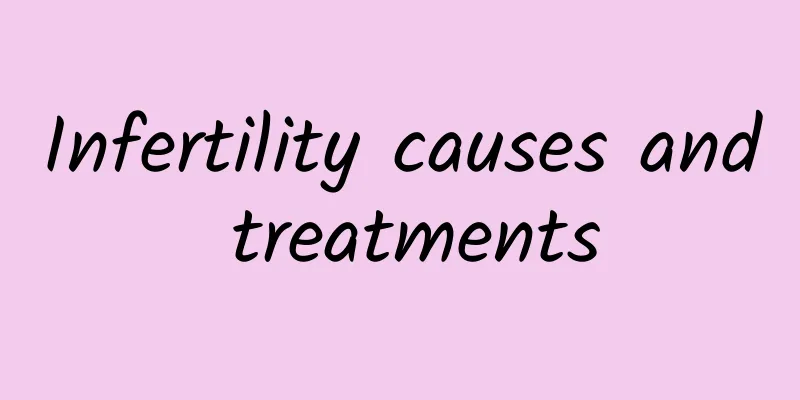Infertility causes and treatments

|
Infertility refers to the inability of a couple to conceive naturally after one year of regular sexual intercourse. The causes are complex and varied, involving all aspects of the male and female reproductive systems. Male infertility is often caused by abnormal testicular function, structural problems with the reproductive system, or decreased sperm quality; female infertility may be related to abnormal ovarian function, blocked fallopian tubes, or endometrial problems. Treatments include medication, surgical correction, and lifestyle adjustments. Early diagnosis and seeking professional medical advice are the key to solving infertility problems. 1 Causes of male infertility There are many causes of male infertility, mainly including structural problems of the reproductive system, abnormal testicular function and sperm quality problems. Structural problems of the reproductive system may cause sperm to be unable to be produced or discharged normally, such as obstruction of the vas deferens. Abnormal testicular function includes testicular dysplasia, testicular injury or surgery that affects sperm production. In addition, sperm quality problems are also a common cause, such as too few sperm, poor motility or abnormal morphology. These problems may be related to genetic factors, environmental pollution, bad living habits, etc. Treatment of male infertility usually includes drug therapy, surgical correction and lifestyle adjustments to help improve sperm quality and quantity and increase the chance of pregnancy. Early diagnosis and seeking professional medical advice are crucial to solving male infertility problems. 2 Causes of female infertility There are many reasons for female infertility, mainly including ovarian dysfunction, fallopian tube obstruction and endometrial problems. Ovarian dysfunction may lead to a decrease in the number or quality of eggs, or ovulation dysfunction, which reduces the chance of fertilization. Fallopian tube obstruction may affect the meeting of eggs and sperm, leading to difficulty in conception. Endometrial problems include endometriosis, polyps, etc., which may affect the implantation and development of the embryo. In addition, factors such as women's physical health, hormone levels, and immune system abnormalities may also play a certain role in infertility. Treatment of female infertility usually includes ovulation stimulation, reproductive tract surgery, and assisted reproductive technology (such as in vitro fertilization). Different treatments will be determined according to the specific situation, aiming to help promote conception and healthy embryo development. Women should seek medical professional advice as soon as possible and work with their doctors to develop an individualized treatment plan. 3Male infertility treatment Treatments for male infertility include medication, surgery, and lifestyle adjustments. Medication mainly includes taking ovulation-inducing drugs, hormone therapy, and supplementing trace elements to help promote sperm production and improve sperm quality. For some cases of testicular dysfunction, surgery may be required to correct structural problems or repair conditions such as vas deferens obstruction. In addition, male infertility patients can also improve their reproductive health through lifestyle adjustments, such as avoiding smoking, limiting alcohol, maintaining a proper weight, and avoiding exposure to environmental pollutants. In addition to traditional treatments, men can also consider assisted reproductive technologies such as sperm extraction and in vitro fertilization. It is important to develop an appropriate treatment plan based on individual circumstances and doctor's advice when choosing a treatment, and to work closely with the doctor for treatment. Early detection of problems and taking effective treatment measures are the key to solving male infertility. 4 Female infertility treatment Treatments for female infertility include ovulation stimulation, genital tract surgery, and assisted reproductive technology. Ovulation stimulation is the use of drugs to promote the development and discharge of eggs and increase the chance of conception. For problems such as blocked fallopian tubes, genital tract surgery may be required to repair the structure or remove obstacles so that sperm and eggs can meet. Assisted reproductive technology such as in vitro fertilization completes the fertilization of sperm and eggs in vitro and then transplants the embryo into the uterus. In addition to these common treatments, women can also improve their chances of pregnancy by improving their lifestyle, such as maintaining a healthy diet, exercising regularly, and reducing stress. In addition, psychological counseling and support are also an important part, because infertility can cause serious psychological pressure on women. For the treatment of infertility, it is important to detect problems early, actively seek professional help, and work with doctors to develop a personalized treatment plan. During the treatment process, couples should support each other, face challenges together, and prepare for future fertility plans. 5. Couples therapy Couples joint treatment refers to a treatment method in which both husband and wife participate in the treatment of infertility. This treatment emphasizes cooperation and support between husband and wife, and jointly facing the psychological and physical pressures brought by infertility. In joint treatment, couples can develop a birth plan together, undergo medical examinations and treatments together, and support and encourage each other. In addition, couples also need to adjust their lifestyle together, improve their diet, reduce stress, and increase the chance of fertility. Couples joint treatment not only helps increase the chances of successful pregnancy, but more importantly, it helps to stabilize and health the relationship between husband and wife, face challenges together, and pursue family happiness together. Author: Wu Yajuan, Department of Reproductive Medicine, First Affiliated Hospital of Henan University of Traditional Chinese Medicine |
>>: Funny Talk About Medicine | Aspirin (with audio)
Recommend
Left lower abdominal pain after abortion
Abortion is a common way in clinical medicine to ...
What are the disadvantages of overwork for pregnant women?
What are the disadvantages of overwork for pregna...
Will I bleed after taking birth control pills? There are so many adverse reactions
I believe everyone is familiar with birth control...
How long is the best time for a woman to have an abortion during pregnancy
Pregnancy itself is a happy thing, but often due ...
Precautions for abortion in four months
Recently, many mothers have had abortions at four...
Fallopian tube adhesion
Adhesions of the fallopian tube opening are a hea...
Girls' running pace chart
Jogging has long become a popular fitness sport f...
Is swimming the best for bones and joints? No, no pressure will make them weak
"You're still running? It will only hurt...
TechInsights: Global smartphone market shipments to grow 12% to 288 million units in Q2 2024
Recently, new data released by TechInsights showe...
What are the dangers of pulling out armpit hair? Can it cause body odor?
Many women frequently pluck their armpit hair in ...
Bleeding during pregnancy
Bleeding from the lower body during pregnancy is ...
How do women get sterilized?
Sterilization is a relatively common method of co...
Can I eat sesame seeds during menstruation?
Women's menstruation is a special physiologic...
Morning sickness relief at 9 weeks of pregnancy
During pregnancy, the body will be stimulated by ...









